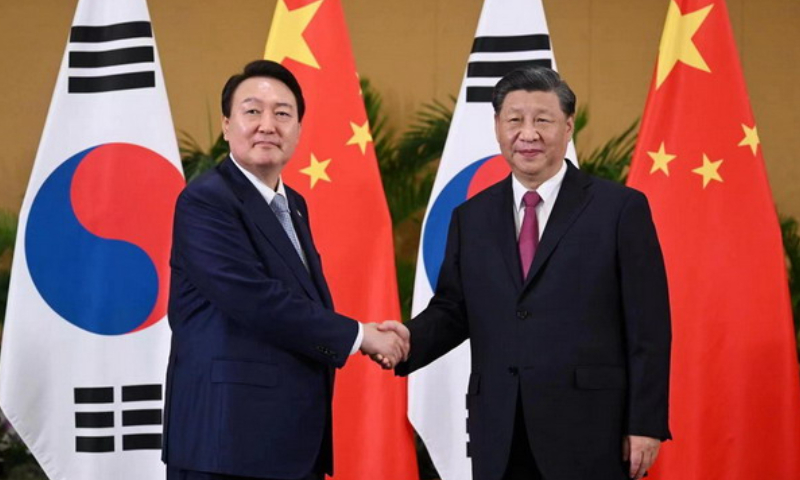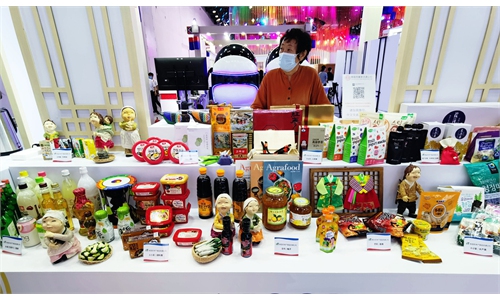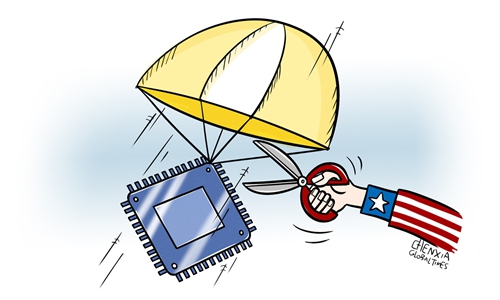China, S.Korea should work to keep supply chain secure, Xi says in meeting with Yoon Suk-yeol

Chinese President Xi Jinping (right) meets with South Korean President Yoon Suk-yeol in Bali, Indonesia on November 15, 2022. Photo: fmprc.gov.cn
Chinese President Xi Jinping said China and South Korea should work together to uphold the international free trade system, keep the global industrial and supply chains secure, stable and unclogged during a meeting with South Korean President Yoon Suk-yeol on Tuesday in Bali, Indonesia.
Xi pointed out that this year marks the 30th anniversary of the establishment of diplomatic ties between China and South Korea, and noted what happened in the past three decades shows that the sound and steady development of China-South Korea relations serves the fundamental interests of their people.
China is ready to work with South Korea to uphold, consolidate and advance the bilateral relationship and to provide greater stability for the region and the world, Xi said.
Xi said the Chinese and South Korean economies are highly complementary and the two countries need to enhance alignment of development strategies and work for common development and prosperity.
The two sides need to accelerate negotiations on a bilateral Free Trade Agreement, deepen cooperation in such areas as high-tech manufacturing, big data and green economy, jointly uphold the international free trade system, keep the global industrial and supply chains secure, stable and unclogged, and oppose politicizing economic cooperation or overstretching the concept of security on such cooperation, Xi stressed.
China and South Korea have huge potential in cooperation, especially in the industrial sector, which relies heavily on the building of industrial chains across countries, Bai Ming, deputy director of the International Market Research Institute at the Chinese Academy of International Trade and Economic Cooperation, told the Global Times on Tuesday.
Both countries should make use of the Regional Comprehensive Economic Partnership (RCEP) to create more opportunities for complementary cooperation and the chip industry could be one of the examples, Bai said.
However, if South Korea itself sets limits on the scope of cooperation with China and joins the small circles of some countries, it would be bad for its economic development and foreign trade, Bai warned.
For some time, South Korea has been under pressure from the US to form a technology alliance to contain China's rise in the tech sphere.
The US government has been trying to pressure Asian economies, including Japan and South Korea, into setting up a so-called Chip 4 alliance to exclude China's chip supply chains.
South Korea's exports to China have increased more than 160 times since the two countries set up diplomatic ties 30 years ago, much higher than the growth rate of Seoul's overall overseas shipments, Yonhap News reported in August, citing data from the Korea International Trade Association.
Also, China has been South Korea's largest export destination since 2003.
Chinese experts said strong bilateral trade figures reflect South Korea's unavoidably close economic ties with China and noted that the two countries need to respect each other's core interests and matters of significant concern, and develop China-South Korea relations in a more mature, independent and stable manner.
Meanwhile, South Korea is betting on China for its chip industry. South Korean companies have invested heavily in China's chip market, and the country exports a huge amount of chip products to China.
According to the Korea International Trade Association, out of South Korea's $69 billion worth of memory chip exports in 2021, exports to China took up about 48 percent.



